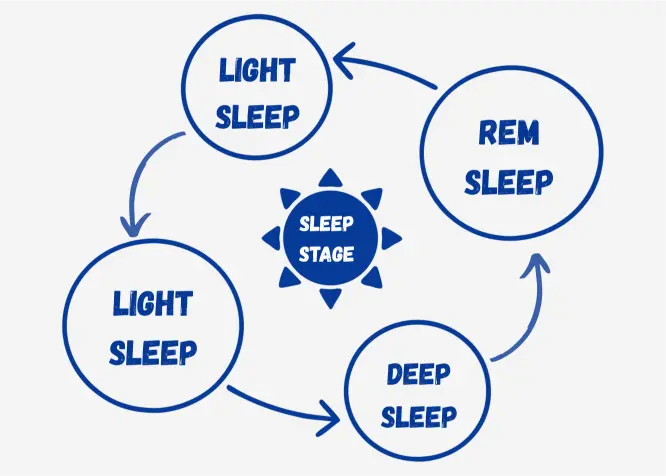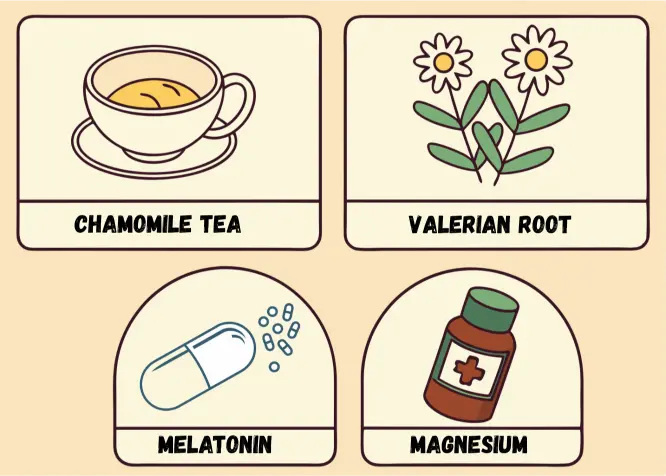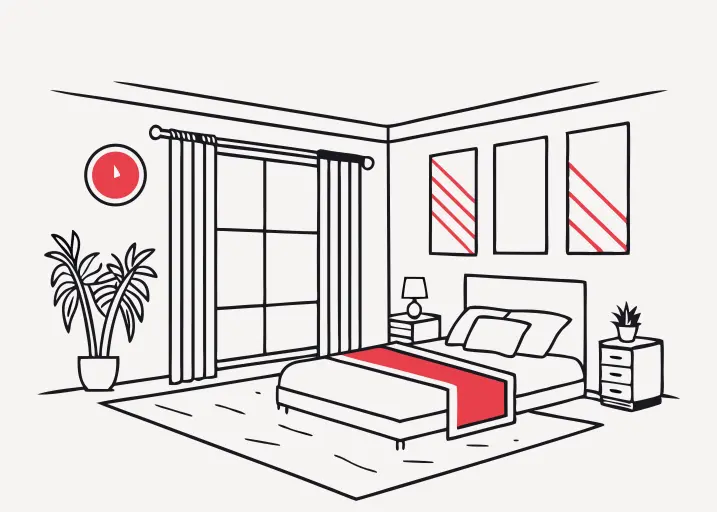What Is Primal Sleep?
Primal sleep is a natural approach to better rest that combines ancient wisdom with modern science. It’s based on how our ancestors slept before artificial lights, electronics, and modern stressors disrupted our natural sleep patterns.
Today, more than one-third of adults don’t get enough quality sleep. We face challenges our ancestors never had – constant artificial light, electromagnetic fields from devices, and chronic stress that keeps our minds racing when we should be resting.
The primal sleep method offers a complete solution. Instead of relying on sleeping pills, it focuses on creating the right conditions for your body to naturally fall into deep, restorative sleep.
Why Quality Sleep Matters
Sleep isn’t just about feeling rested. During sleep, your body goes through four important stages that each serve specific purposes:
- Stage 1 (Light Sleep): The transition from being awake to sleeping
- Stage 2 (Light Sleep): Your heart rate slows and body temperature drops
- Stage 3 (Deep Sleep): Your body repairs tissues, builds muscle, and strengthens your immune system
- Stage 4 (REM Sleep): Your brain processes memories and dreams occur
These cycles repeat every 90-120 minutes throughout the night. Deep sleep is when the real magic happens – your body releases growth hormones, fights off infections, and clears toxins from your brain.
Your body’s internal clock, called your circadian rhythm, controls when you feel sleepy or alert. This 24-hour cycle responds mainly to light and darkness. When artificial light disrupts this rhythm, your sleep quality suffers.

Natural Sleep Remedies That Actually Work
Valerian Root: Nature’s Sleep Aid
Valerian root has been used for centuries to promote sleep. It contains compounds that increase GABA activity in your brain, helping you relax and feel less anxious.
Studies show valerian can help you fall asleep 14-17 minutes faster and improve overall sleep quality. The typical dose is 300-600mg taken 30-60 minutes before bedtime.
Melatonin: Your Natural Sleep Hormone
Melatonin is a hormone your brain naturally produces when it gets dark. As a supplement, it can help you fall asleep about 10 minutes faster.
It’s especially helpful for jet lag or if you work night shifts. The best dose is usually 0.5-3mg taken 1-2 hours before you want to sleep. Start with the lowest dose first.
Chamomile: The Gentle Sleep Tea
Chamomile tea contains apigenin, a compound that binds to receptors in your brain and produces mild calming effects. Research shows it can improve sleep quality and help people with insomnia function better during the day.
Drinking chamomile tea 30-60 minutes before bed is a gentle, caffeine-free way to wind down.
Magnesium: The Relaxation Mineral
Magnesium helps activate GABA receptors and reduces stress hormones like cortisol. This essential mineral can help treat insomnia and restless leg syndrome while calming your nervous system.
Taking 200-400mg of magnesium 1-2 hours before bedtime can also help reduce anxiety and mild depression that often interfere with sleep.
Other Helpful Natural Remedies
- L-tryptophan and GABA: These work together to enhance your natural sleep processes
- Ashwagandha: This adaptogen can improve sleep quality by up to 72% and reduce the time it takes to fall asleep by over 50%
- Passionflower: Known for reducing anxiety and nervous restlessness without causing dependency

Creating Your Perfect Sleep Environment
Control Light Exposure
Light is the most powerful controller of your sleep-wake cycle. In fact, getting natural sunlight exposure during the day can help reset your circadian rhythm and support better nighttime rest.
Solutions:
- Install blackout curtains to eliminate outside light
- Avoid screens for at least one hour before bed, or use blue light blocking glasses
- Use red light bulbs in the evening instead of bright white lights
Optimize Temperature
Your body temperature naturally drops as you prepare for sleep. The ideal bedroom temperature is between 60-68°F (15.5-20°C).
Temperatures above 71°F can cause restlessness and disrupt REM sleep, while temperatures below 53°F make it difficult to fall asleep.
Reduce Electromagnetic Fields (EMF)
EMF exposure from electronic devices can interfere with sleep quality by affecting cellular function and blood flow.
Tips:
- Remove or turn off electronic devices in your bedroom
- Keep necessary devices at least 3-6 feet away from your bed
- Use airplane mode or dedicated sleep mode settings
Choose the Right Sleep Surface
Some people following primal sleep principles prefer firmer surfaces that better support natural spinal alignment. Others also find that low-frequency sleep sounds like green noise improve sleep onset, especially in noisy environments.

Building Your Primal Sleep Routine
Essential Sleep Habits
- Keep a consistent schedule: Go to bed and wake up at the same time every day, even on weekends
- Create a wind-down routine: Start relaxing 30-60 minutes before bedtime
- Watch your evening meals: Eat dinner at least 3 hours before bedtime
- Cut off caffeine: Avoid caffeine after lunch if you’re sensitive to it
- Limit alcohol: While it might make you drowsy initially, alcohol disrupts sleep quality
Step-by-Step Bedtime Routine
- Set a wind-down alarm 1-2 hours before bedtime
- Turn off all electronic devices at least one hour before bed
- Prepare for tomorrow (lay out clothes, pack lunch) to reduce morning stress
- Engage in relaxing activities like reading, gentle stretching, or meditation
- Enjoy herbal tea like chamomile
- Make sure your bedroom is cool, dark, and quiet

Common Sleep Problems and Solutions
“I’m Tired But Can’t Sleep”
This frustrating situation often happens when you’re physically exhausted but your mind is still racing. Here’s what helps:
Breathing exercises: Try the 4-7-8 technique – inhale for 4 counts, hold for 7, exhale for 8. This activates your body’s relaxation response.
Progressive muscle relaxation: Tense and release different muscle groups starting from your toes and working up to your head.
Journaling: Write down your worries or tomorrow’s tasks to clear mental clutter and reduce anxiety.
Managing Stress and Anxiety
Chronic stress is a major cause of sleep problems. Natural adaptogens like ashwagandha and passionflower can help manage underlying stress while directly improving sleep quality.
Regular meditation, yoga, or tai chi can help manage chronic stress, but these should be part of your daily routine, not just bedtime activities.
Natural Remedies for Sleep Apnea
While severe sleep apnea requires medical treatment, mild cases may benefit from natural approaches:
- Maintain a healthy weight to reduce airway obstruction
- Avoid alcohol, which relaxes throat muscles
- Sleep on your side instead of your back
- Elevate the head of your bed slightly
- Some herbs like valerian may help with sleep quality, though they don’t treat the underlying breathing issues
Jet Lag and Shift Work
For eastward travel, take 0.5-3mg of melatonin at bedtime in the new time zone. For westward travel, take smaller doses (0.3mg) in the morning.
If you work shifts, maintain consistent sleep schedules even on days off, and consider fatigue management basics to prevent burnout and enhance performance.
How to Use Sleep Supplements Safely
Timing and Dosage
Most natural sleep supplements work best when taken 20-30 minutes before bedtime. This gives them time to be absorbed and start working.
Start with the lowest effective dose and monitor your response over several weeks. Many primal sleep formulations combine multiple ingredients for better results than single ingredients alone.
Safety Considerations
- Most natural sleep aids don’t create physical dependence like prescription medications
- However, psychological dependence can develop with any sleep aid
- Choose supplements from reputable manufacturers with third-party testing
- Discuss supplement use with your healthcare provider, especially if you take medications
Starting Your Primal Sleep Journey
Don’t try to change everything at once. Here’s a gradual approach:
Week 1-2: Establish a consistent sleep schedule and basic bedtime routine Week 3-4: Optimize your sleep environment (temperature, lighting, EMF reduction) Week 5-6: Try natural sleep aids like chamomile tea or magnesium Week 7-8: Add stress management techniques and advanced sleep practices
The Benefits of Primal Sleep
When you follow primal sleep principles, you can expect improvements in:
- Physical health: Better immune function, improved cellular repair, better blood sugar control
- Mental performance: Better memory, improved focus, better emotional control, increased creativity
- Energy levels: More consistent energy throughout the day, less afternoon fatigue, better exercise performance
Final Thoughts
Primal sleep offers a natural, sustainable approach to better rest. Instead of masking sleep problems with medications, it addresses the root causes by supporting your body’s natural sleep processes.
Quality sleep isn’t a luxury – it’s essential for your physical and mental health. By following these primal sleep principles, you’re investing in your overall quality of life and long-term health.
Start small, stay consistent, and give your body time to adapt to these natural sleep-promoting strategies. Remember, the goal is to work with your body’s natural rhythms, not against them.








